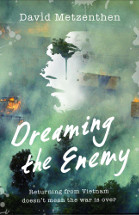Dreaming the enemy by David Metzenthen

Allen and Unwin, 2016. ISBN 9781760112257
In what appears to be based on the Battle of Coral which took place
during the Vietnam War, Johnny Shoebridge, a conscripted Australian
infantryman endures unspeakable terror defending a 'Firebase' of
artillery and mortars. The Firebases enabled significant targets
such as supply routes to be shelled and also offered support to
infantry if powerful enemy forces were contacted.
When hordes of North Vietnamese soldiers and Vietcong guerrillas
attack a newly positioned and inadequately prepared Firebase on the
first night after it was set up, Johnny and his mates Barry and Lex
must fight desperately in their infantry units which were placed to
defend the guns.
I liked this story for many reasons, not least because the
reader is transported to a place where the gut wrenching fear is
almost palpable and the crescendo of explosions and screams is
overwhelming. Most important however, is the fact that this is
achieved without any glorification of war.
The story is told in a series of flashbacks in civilian life when
Johnny is trying to adjust to being an ordinary person after
returning from military service. The flashbacks not only recount the
experiences of Johnny and his mates but he also displays an acute
awareness of the service and suffering of the enemy in his dreams
about a wounded and traumatised soldier 'Khan'.
In trying to connect with people, Johnny has no control over the
memories and dreams which flood his waking moments, to a point where
at times he loses track of what is real. The theme of mateship is
omni-present in Australian war literature and the concept of
soldiers having a far greater fear of letting their mates down than
dying themselves is clearly very real. Metzenthen has created an
authentic story which I feel would meet with approval from those who
served, on the grounds that the detail is accurate, the humour is
realistic and there is a profound respect for the soldiers from both
sides which is unwavering even when pointing to the insanity of the
war itself.
The author emphasises that what the Australian, New Zealand and
American service men endured was so immense and significant that it
was literally life changing, often permanently and all too often
being terribly destructive in terms of physical and psychological
injury. Without insulting these individuals in any way however, the
author questions this terrible suffering against the outcome of the
war. Metzenthen also reveals the war and post-conflict experience of
the North Vietnamese people, who saw only that their country was
invaded. The unequal nature of warfare between lightly armed
guerrillas and the almost unbelievable might of Western firepower is
considered with great sensitivity. The reader is left with the sense
that after all the civilian and military deaths, all the injuries
and the unspeakable destruction and poisoning of the environment,
the outcome was pretty much the same as it would have been if the
war had not been waged.
Rob Welsh